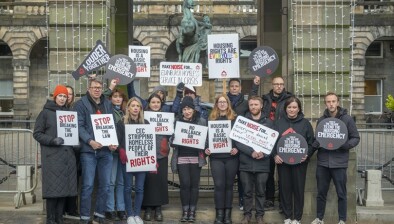Edinburgh to consider lettings policy suspension until March

The City of Edinburgh Council is to consider extending the suspension of its housing lettings policy until March 2027.
The local authority took the unprecedented step to suspend its general council house letting policy in April this year, amid a mounting homelessness crisis and a failure to meet legal obligations to provide suitable temporary accommodation.
The emergency measure saw the vast majority of council-owned housing stock redirected toward people experiencing homelessness. Only people who have accessibility concerns or whose only alternative is taking up a care space, alongside a handful of other people in exceptional circumstances, have been offered spaces since.
Figures set to go before the Housing, Homelessness and Fair Work Committee say that 50.4% of households presenting as homeless in October could not be accommodated by the council – down from 58.6% in April.
Some 271 households could not be accommodated by the council in October, while data for November 10 showed that 99 people were known to be sleeping rough in the capital.
The report also stated that 978 households were in unsuitable accommodation as of November 14, including 180 households with young people and 18 families with children.
Members of the committee are to meet on Tuesday to consider two future options.
Option 1 – Suspension of allocations policy ends December 2025
In this option, the allocation of council homes (voids and new builds) returns to pre-suspension levels, whereby 60% of homes are allocated to homeless households in temporary accommodation, via the normal lettings process. No homes are transferred for use as suitable temporary accommodation and compliance issues relating to the use of unsuitable temporary accommodation remain.
Option 2 – Suspension of allocations policy ends March 2027
This option assumes that the majority of homes (60%) will be made available as a permanent home for households in temporary accommodation via a direct let. 15% of homes would continue to be transferred for use as suitable temporary accommodation. The number of households in unsuitable temporary accommodation in this option reduces to 268 by March 2027. This is significantly lower than projected in August 2025, where the projection was 517 at the end of March 2027.
Officers are recommending that the committee members select the second option.
Housing charity Shelter Scotland has criticised the recommendation. It said an extension should only be granted until February of next year, and that housing staff should use the time to work up an interim allocations policy.
Shelter Scotland’s assistant director of communications and advocacy, Gordon Llewellyn-MacRae, said: “We recognise the suspension of lettings is an emergency response to an emergency situation. We regret that it was allowed to come to this, but the original proposal was the right thing to do in the circumstances.
“This time last year, we were alarmed at the efforts from the City of Edinburgh Council to suspend rights rather than take steps to ensure rights. That was why we welcomed the suspension of choice-based lettings to achieve the stated goal of ending ‘Failure to Accommodate’ breaches and to lift children out of unsuitable temporary accommodation.
“It is clear that work to end the housing emergency in Edinburgh and ensure the council operates lawfully will take many months. That is why it is important that elected members and council officers maintain public confidence in how decisions are made by demonstrating the highest standards of transparency and evidence gathering.
“In our view, the suspension of choice-based lettings should not be extended until March 2027 because key information to inform the public about how decisions will be made is missing at present.
“Shelter Scotland believes that elected members should only consider allowing a further two-month extension, until the next scheduled meeting of the Housing, Homelessness and Fair Work Committee on 10 February 2026. During this time, officers should be instructed to consult upon and publish an interim allocations policy which outlines how officers determine how priority is given to those being allocated housing under the interim system, how equalities concerns are being managed and the monthly milestones which would demonstrate success. It should also outline what evidence would require that choice-based lettings could be reopened earlier than March 2027.
“Until these policies are in place, it would not be appropriate to remove regular democratic oversight of allocations policies in the City of Edinburgh.”








